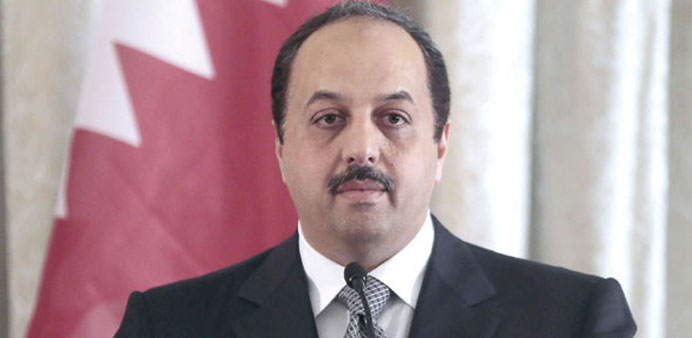Reuters/London
Qatar yesterday condemned the Islamic State’s “barbaric” murder of US journalist James Foley and flatly rejected accusations of giving financial support to the militant group.
HE the Foreign Minister Dr Khalid bin Mohamed al-Attiyah’s comments came a day after the German government apologised for remarks by a minister accusing Qatar of financing Islamic State militants.
HE al-Attiyah described the recent comments as ill-informed.
“Qatar does not support extremist groups, including ISIS, in any way. We are repelled by their views, their violent methods and their ambitions,” he said in a statement released in London.
“The vision of extremist groups for the region is one that we have not, nor will ever, support in any way.”
Qatar has previously denied supporting Islamist insurgents who have seized wide areas of northern Iraq, northern and eastern Syria.
Al-Attiyah said Qatar’s goal was to do all it could to see peace and justice across the region and called for collective action to end the violence in Iraq and Syria.
He urged the Iraqi government to provide safety and security for its citizens and vowed that Qatar would continue to provide humanitarian aid to the Iraqi people.
“The killing of innocent civilians and the forced flight of hundreds of thousands of people threatens the very existence of Iraq and the peace and security of the entire region,” he said.
“So while, along with many other countries from the Middle East and wider international community, we have supported the Syrian opposition to the Assad regime, we do not fund ISIS or other extremist factions.”
Qatar later yesterday strongly condemned and denounced the attack on worshipers inside a mosque in Iraq’s Diyala province, leaving at least 70 people killed and dozens wounded.
The Foreign Ministry in a statement released in Doha stressed that such acts targeting civilians “contradicted all the human and moral values”.
On Thursday, Qatar’s Ministry of Foreign Affairs had condemned Foley’s murder “at the hands of a criminal group”.
“The ministry described the incident as a heinous crime that goes against all Islamic and humanitarian principles as well as international laws and conventions,” the official Qatar News Agency (QNA) said.
In Iraq yesterday, officials worked to ease soaring tensions after the massacre at the mosque in Diyala province, as attacks in Baghdad and areas to its north killed 30 more.
The attack at the mosque in Diyala province the day before threatens to increase anger among Iraq’s Sunni minority with the Shia-led government at a time when an anti-militant drive depends on their co-operation.
The violence came as the US, which is carrying out air strikes in Iraq against Islamic State militants, ramped up its rhetoric over the grisly killing of Foley by the group and shown in a video posted online.
US Deputy National Security Adviser Ben Rhodes said Foley’s beheading “represents a terrorist attack against our country”.
Yesterday, Iraq’s Sunni parliament speaker sought to calm sectarian tensions.
Salim al-Juburi called for political unity and said “the main aim (of the mosque attack) is to foil all the efforts that have been made to form a government”.
Saudi Arabia to host Arab meeting on Syria, IS crisis
Saudi Arabia is to host a meeting of foreign ministers from several Arab states to discuss the Syrian conflict and the rise of Islamic State militants, Egypt’s foreign ministry announced yesterday. It said Egypt, Jordan, Qatar, the United Arab Emirates and Saudi Arabia were to take part in today’s talks. The meeting will address “the growing presence in Iraq and Syria of extremists, notably the Islamic State (IS)”, the ministry said in a statement. It added that the rise of IS meant the “search for a political solution to the Syria crisis was needed more than ever”.
Since declaring a “caliphate” in June. IS has conducted a lightning offensive, taking control of territory straddling Iraq and Syria.

